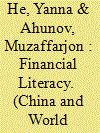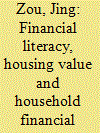|
|
|
Sort Order |
|
|
|
Items / Page
|
|
|
|
|
|
|
| Srl | Item |
| 1 |
ID:
163303


|
|
|
|
|
| Summary/Abstract |
This article presents the advanced financial literacy of Malaysian Gen Y investors and investigates whether literacy varies across demographics and ethnicity, and how financial literacy is related to investing decisions. In a survey-based study (N = 231) with the estimation of crosstab, ordered logistic regression and binary logistic regression, the results suggest that Gen Y investors display a medium level of financial literacy and that investors with certain demographic characteristics and ethnicity display a relatively higher level of financial literacy. Literacy items such as knowledge of stocks and bonds, functioning of the stock market, working of long-term bonds and mutual funds, and riskiness of bonds versus stocks are more closely related to investors’ trading, risky share investment, willingness of risk-taking, stock market participation and perceived portfolio returns. The results imply a clear scope to improve Gen Y investors’ financial literacy by concentrating on a certain socio-demographic groups and specific financial literacy items.
|
|
|
|
|
|
|
|
|
|
|
|
|
|
|
|
| 2 |
ID:
169050


|
|
|
|
|
| Summary/Abstract |
Financial literacy is defined as the knowledge, skills, and ability to navigate increasingly complex financial markets, and is considered to empower consumers to make responsible financial decisions. It has been widely promoted as a crucial life skill following the 2008 financial crisis. This study critically analyzes financial literacy education initiatives in Turkey through ethnographic research. Financial literacy curricula provide the basic knowledge of finance as well as instruct subjects ways to conduct financial planning, budgeting, debt management, creditworthiness, saving, and investment. Financial literacy agenda deepens neo-liberal governmentality by promoting an entrepreneurial subjectivity and making individuals more aware and responsible for social risks. The cultural political economy perspective of this study analyzes financialized capital accumulation dynamics together with the reshaping of culture and the constitution of financialized subjectivities.
|
|
|
|
|
|
|
|
|
|
|
|
|
|
|
|
| 3 |
ID:
188155


|
|
|
|
|
| Summary/Abstract |
We scrutinized determinants of financial literacy in China – the largest developing economy, and one with a rapidly expanding financial landscape. We used the China Household Finance Survey's 2013 and 2015 waves, which included the so-called “Big Three” financial literacy questions that test individuals' understanding of compound interest rates, inflation, and risk. We found that financial literacy in the country was low. Our results showed that, unlike in developed countries, risk literacy in China was high and financially illiterate people's awareness of their own lack of financial skills was high. Importantly, we showed that female, old, less educated, and low-income people were increasingly lagging in gaining financial skills. This was especially true for the western and central regions of China. Our study complements a limited number of studies on the financial literacy of the middle class in developing economies.
|
|
|
|
|
|
|
|
|
|
|
|
|
|
|
|
| 4 |
ID:
168343


|
|
|
|
|
| Summary/Abstract |
Using data from the 2012 consumer finance survey in China, we extend the literature on household finance by examining the effects of both financial literacy and housing value on household financial market participation, the role of which has been examined separately in the existing literature. The results show that financial literacy significantly improves the probability of household financial market participation, while the housing value has an obvious “crowding-out effect” on household financial market participation in urban China. Further research finds that the role of financial literacy in household financial market participation in households with a low housing value is stronger than that in households with a high housing value. Furthermore, the study of the regional differences shows that among households with a high housing value, financial literacy plays a more significant role in household bond market participation in less-developed cities. Among households with a low housing value, improvement in financial literacy plays a more significant role in household fund market participation in less-developed cities and under-developed cities. Our findings remain robust after alleviating potential bias due to endogenous problems by applying the instrumental variable (IV) method and propensity score matching (PSM) method. Finally, the paper proposes corresponding policy recommendations.
|
|
|
|
|
|
|
|
|
|
|
|
|
|
|
|
| 5 |
ID:
182757


|
|
|
|
|
| Summary/Abstract |
We conducted an experiment and survey in Shenzhen, China, to measure individuals' risk preferences, financial literacy, and the effect of a financial education program. A proportion of individuals may be unaware of the high risk associated with a high-return financial product and thus may purchase financial products inconsistent with their risk attitudes. Participating in our education program significantly reduced individuals' tendency to hypothetically invest in high-risk products, especially for those who are risk-averse. Therefore, rather than randomly assigning the education program to investors, we suggest that risk-averse investors be targeted. We find that the responses to standard financial literacy questions are not related to individuals' awareness of the link between high risk and high return, calling for a newly designed question of financial literacy as proposed in our study.
|
|
|
|
|
|
|
|
|
|
|
|
|
|
|
|
|
|
|
|
|